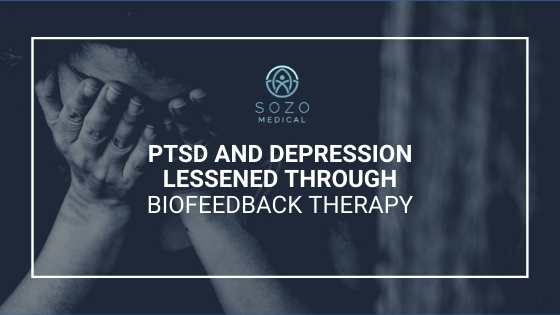Article Contents
Biofeedback therapy is an innovative technique used to treat a variety of conditions, including in the lessening of symptoms of PTSD and depression. This therapy is extremely effective in treating many psychiatric conditions including Post-traumatic stress disorder (PTSD) and depression. Symptoms of PTSD and depression both manifest as physiological ones or ones that are physically experienced, but difficult to control. These physiological symptoms are classified as involuntary, which means they happen without someone having to think about it.
The physical side effects of PTSD and depression are terribly distressing for people experiencing them. Both conditions lead to feelings of helplessness which typically worsen as the physical symptoms heighten. This is where biofeedback therapy comes in. Biofeedback therapy works to link involuntary physiological responses to sensory cues, such as light or sound, that are easier to interpret. These techniques provide patients with a better understanding of these involuntary physiological responses and help them gain some control over their mental health.
What is Biofeedback Therapy?
Biofeedback therapy uses electronic sensors or electrodes, which are attached to the skin, to measure bodily functions. With the guidance of a therapist trained in these techniques, the electrodes transmit data to a monitor, which converts the data into images, sounds, or light. These forms of media help provide patients with an easier way to understand their physical symptoms. The therapist then teaches them ways to adjust these otherwise involuntary physiological responses. These involuntary responses are also referred to as lower brain functions. Biofeedback therapy electrodes measure:[1]
- Neurological function or brain waves
- Sweating
- Skin Temperature
- Muscles activity and tension
- Heart rate
- Breathing rate
- Blood pressure
As sessions progress, people are able to start controlling their involuntary physiological responses with progressive ease. The brain does this by utilizing what is known as higher brain function. Higher brain function includes and regulates skills such as reasoning, logic, and problem-solving. Biofeedback therapy works by encouraging people to use higher brain functions to understand their lower brain functions. This effectively allows them to direct some of these activities to an area of the brain that provides more control and higher functioning. This includes slowing their own heart rate, blood pressure, and breathing rate as well as decreasing sweating, skin temperature, and muscle tension. All of this is achieved through various relaxation techniques that are taught by the trained biofeedback therapist.
The Effects of PTSD and Depression
PTSD and Depression are both psychiatric disorders that cause heightened physical reactions. These disorders commonly occur together.[2] The symptoms usually begin manifesting after a traumatic event or when high levels of stress are put on the mind and body. Stress is one of the most common triggers for inciting episodes of PTSD and Depression. As a result, the most common symptom that people who suffer from PTSD and Depression report is high levels of anxiety.
These high levels of anxiety cause physical stress on the body. This long-term stress ultimately leads to debilitating symptoms, including:[3]
- Rapid heart rate
- Increase in blood pressure
- Breathing heavily (hyperventilation)
- Excessive sweating
- Muscle twitching and spasms
- Restlessness
One of the best ways to treat these symptoms is to practice relaxation techniques. These include mediation, visualization techniques, and breathing exercises. All of these techniques are taught during therapy sessions and become easier with practice.
Symptoms of PTSD That Are Lessened Through Biofeedback
Post-traumatic stress disorder is incited by severely traumatic events. Symptoms are usually delayed after the initial occurrence and may not start for months to years afterward. These symptoms significantly impact daily life for people coping with PTSD. Biofeedback therapy helps lessen an array of symptoms associated with PTSD, such as:
- Mood swings
- Intrusive memories of traumatic events
- Episodes of agitation
- Emotional outbursts
- Physical outbursts
Symptoms of Depression That Are Lessened Through Biofeedback
Depression negatively impacts daily life for the sufferer. It interferes with their ability to successfully carry out day-to-day tasks. Commons symptoms of depression that can be managed and reduced with the help of biofeedback therapy include:
- Fatigue
- Feelings of hopelessness and worthlessness
- Difficulty concentrating
- Insomnia
- Irritability
- Emotional outbursts
- Restlessness
- Muscle pain or aches
- Loss of interest
How Is Biofeedback Therapy Useful In Lessening the Symptoms of PTSD & Depression?
Biofeedback therapy is a way to increase understanding of the biological side effects for people coping with mental health conditions like PTSD and depression. By having a greater awareness of their body, people undergoing treatment for PTSD and depression with biofeedback therapy are able to control how they react to their symptoms. This enables them to prevent their symptoms from escalating to more serious levels and lessen symptoms of PTSD and depression over time.
During biofeedback therapy, the biological manifestations of PTSD and depression are translated into visual and auditory representations using biosound. These representations are in the form of images, sounds, and light. As these images, sounds, and light are linked to the involuntary functions, the patient person undergoing therapy starts to associate the two. As a result, this person becomes more conscious of these involuntary functions. As a person’s awareness of the symptoms of their PTSD and depression increases, so does their ability to enact control over them. Biofeedback therapy lessens symptoms of PTSD and depression by teaching patients to employ multiple calming and relaxation techniques.
With the guidance of the biofeedback therapist, a person suffering from PTSD and depression practices breathing exercises and muscle relaxation techniques. As the body begins to relax, so does the mind. By slowing down the involuntary functions, anxiety decreases and the mental symptoms of PTSD and depression begin to ease.
Get Started on the Path to Wellness Today
It is important to undergo biofeedback therapy with a licensed therapist who has undergone training in the proper techniques. Our facility located near Fort Lauderdale has a staff comprised of therapists who will be able to help you through every step of the way. They will work closely with you to develop an individualized treatment plan that fits your unique needs. Contact us today if you’re interested in lessening your symptoms of PTSD and depression with biofeedback therapy.
References:
- https://www.webmd.com/pain-management/biofeedback-therapy-uses-benefits#2
- https://www.healthline.com/health/ptsd-and-depression
- https://www.healthline.com/health/anxiety-symptoms#symptoms

All of the information on this page has been reviewed and verified by a certified addiction professional.

